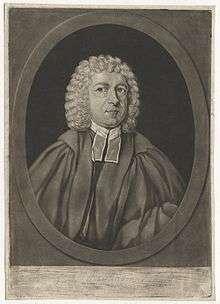Richard Rawlinson
Richard Rawlinson FRS (3 January 1690 – 6 April 1755) was an English clergyman and antiquarian collector of books and manuscripts, which he bequeathed to the Bodleian Library, Oxford.[1]

Life
Richard Rawlinson was a younger son of Sir Thomas Rawlinson (1647–1708), Lord Mayor of the City of London in 1705–6, and a brother of Thomas Rawlinson (1681–1725), the bibliophile who ruined himself in the South Sea Company, at whose sale in 1734 Richard bought many of the Orientalia. He was educated at St Paul's School, at Eton College, and at St John's College, Oxford. In 1714, he was elected a Fellow of the Royal Society, where he was inducted by Newton. Rawlinson was a strong supporter of the exiled Stuarts and in 1716 was ordained as a Deacon and then priest in the nonjuring Church of England (see Nonjuring schism) and Jacobite. The ceremony was performed by the non-juring Usager bishop, Jeremy Collier. Rawlinson was, in 1728, consecrated as a Bishop in the nonjuring church by Bishops Gandy, Blackbourne and Doughty. On Blackbourne's death he became the senior nonjuring Bishop in London but seems to have given up his clerical duties later in his life.
Rawlinson then travelled in England and on the continent of Europe, where he passed several years, making very diverse collections[2] of manuscripts, coins and curiosities, his books alone forming three libraries, English, foreign and Classical. In 1728 he became a bishop among the nonjurors, but he hardly ever appears to have discharged episcopal functions, preferring to pass his time in collecting books and manuscripts, pictures and curiosities. He died at Islington, London.
Rawlinson was a friend of the antiquarian Thomas Hearne and, among his voluminous writings, published a Life of the antiquary Anthony Wood.
Towards the end of his life, Rawlinson quarrelled with both the Royal Society and the Society of Antiquaries.[3] Cutting the Society of Antiquaries from his bequests, he began transferring his collections to the Bodleian. A series of almanacs in 175 volumes, ranging in date from 1607 to 1747 arrived in 1752–55. At his death, Rawlinson left to the Library 5,205 manuscripts bound in volumes that include many rare broadsides and other printed ephemera, his curiosities, and some other property that endowed a professorship of Anglo-Saxon at Oxford University. The Rawlinsonian Professor of Anglo-Saxon was first appointed in 1795. He was also a benefactor to St John's College, Oxford.
Richard Rawlinson is buried at St John's College, Oxford. Rawlinson Road in North Oxford is named after him.[4]
Notes
- Lee, Sidney, ed. (1896). . Dictionary of National Biography. 47. London: Smith, Elder & Co. pp. 331–333.
- "His collections in the Bodleian Library defeat the most persistent attempts at analysis" Brian J. Enright wrote in his introductory remarks to Tashjian and Enright 1991.
- He stipulated in his will that no F.R.S. or F.R.A.—-nor Irishman nor Scot nor native of the colonies—-should hold the chair he endowed, a direction that was ignored. (Tashjian and Enright 1991).
- Symonds, Ann Spokes (1997). "Buildings and Gardens". The Changing Faces of North Oxford. Book One. Robert Boyd Publications. p. 13. ISBN 1-899536-25-6.
References

- Rawlinson Manuscripts, Bodleian Library, Oxford, UK.
Further reading
- Georgian R. Tashjian, David R. Tashjian, and Brian J. Enright (1991), Richard Rawlinson: A Tercentenary Memorial (Western Michigan University, Kalamazoo: Medieval Institute Publications). ISBN 0-932826-23-7.
External links
- Richard Rawlinson at Find a Grave
- Works by or about Richard Rawlinson in libraries (WorldCat catalog)